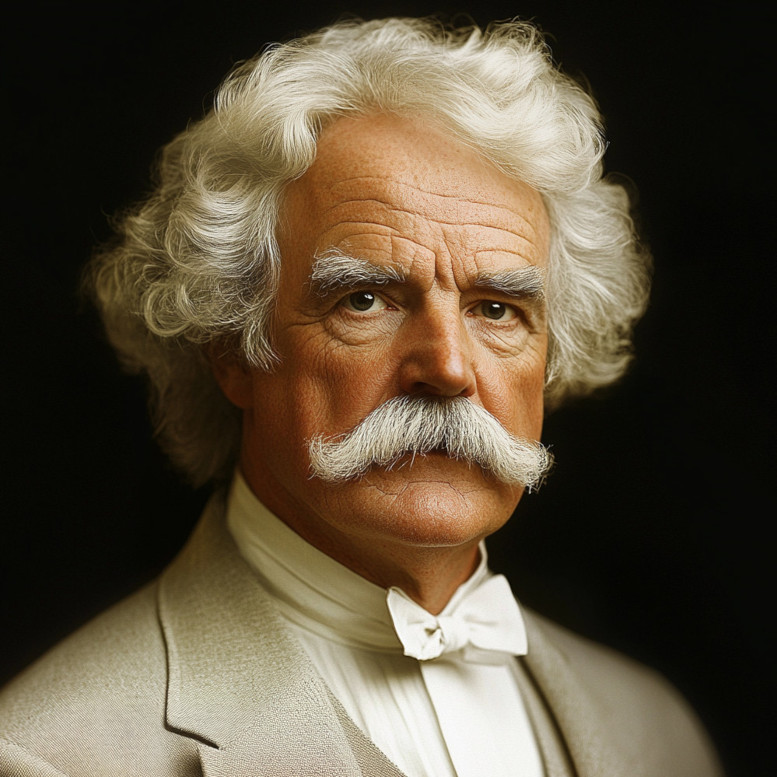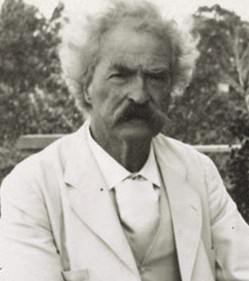


Mark Twain (1835–1910), born Samuel Langhorne Clemens, was an American author, humorist, and lecturer, widely regarded as one of the greatest writers in American literature. Twain's works, known for their wit, social criticism, and vivid depiction of life along the Mississippi River, include classics such as The Adventures of Tom Sawyer and Adventures of Huckleberry Finn. Often referred to as the "father of American literature," Twain's influence extends far beyond his time, with his novels, essays, and lectures continuing to be studied and celebrated for their insight into human nature and American society.
Riverboat Pilot: In 1857, Clemens fulfilled a lifelong dream by becoming a licensed riverboat pilot on the Mississippi River, a job he held until the outbreak of the Civil War in 1861. The riverboat life greatly influenced his writing, providing material for many of his future works, including his pen name—"Mark Twain," a riverboat term meaning two fathoms deep, or safe water for navigation.
Western Adventures: After the Civil War disrupted river traffic, Clemens headed west with his brother Orion in 1861, first to Nevada and then to California. He tried his hand at various jobs, including mining and journalism, and began to establish himself as a writer, adopting the pen name "Mark Twain." His experiences in the West were later chronicled in Roughing It (1872), a semi-autobiographical account of his travels and adventures.
"The Celebrated Jumping Frog of Calaveras County": Twain's first major success as a writer came with the publication of "The Celebrated Jumping Frog of Calaveras County" in 1865. The humorous short story, based on a tall tale he heard while in California, was published in newspapers and magazines across the country, earning Twain national recognition.
The Innocents Abroad (1869): Twain's first major book, The Innocents Abroad, was a travelogue based on his experiences during a journey to Europe and the Holy Land. The book's satirical take on European culture and the behavior of American tourists became an instant success, establishing Twain as a prominent literary figure.
The Adventures of Tom Sawyer (1876): The Adventures of Tom Sawyer is one of Twain's most beloved novels, capturing the innocence and mischief of childhood in a small town along the Mississippi River. The book, set in the fictional town of St. Petersburg, Missouri, is loosely based on Twain's own experiences growing up in Hannibal. The character of Tom Sawyer, with his adventurous spirit and knack for getting into trouble, became an iconic figure in American literature.
Adventures of Huckleberry Finn (1884): Widely considered Twain's masterpiece, Adventures of Huckleberry Finn is a sequel to Tom Sawyer but is darker and more complex. The novel follows Huck Finn, a young boy fleeing from his abusive father, as he journeys down the Mississippi River with Jim, a runaway enslaved man. The book is celebrated for its vivid depiction of life in the pre-Civil War South and its biting critique of racism and slavery. Twain's use of vernacular language and his exploration of moral dilemmas in the novel have made it a cornerstone of American literature, though it has also faced controversy and censorship over the years due to its portrayal of race and use of racial slurs.
Other Major Works: Twain continued to write prolifically throughout his life, producing a wide range of novels, short stories, essays, and lectures. Some of his other notable works include The Prince and the Pauper (1881), a novel that explores themes of social inequality; A Connecticut Yankee in King Arthur's Court (1889), a satirical novel about time travel and technology; and Pudd'nhead Wilson (1894), a novel that examines issues of identity, race, and justice.
Marriage and Family: In 1870, Twain married Olivia Langdon, the daughter of a wealthy New York coal merchant. The couple settled in Hartford, Connecticut, where they raised four children: Susy, Clara, Jean, and Langdon (who died in infancy). Twain and Olivia had a deep and loving relationship, and Olivia served as an important editor and critic of his work.
Financial Troubles: Despite his literary success, Twain faced significant financial difficulties later in life due to a series of poor investments, particularly in new technologies such as the Paige typesetting machine, which ultimately failed. In 1894, he declared bankruptcy, but he was able to repay most of his debts through a series of successful lecture tours around the world.
Public Speaking and Lectures: Twain was a highly sought-after public speaker, known for his humor, wit, and storytelling ability. His lectures were popular both in the United States and abroad, and he often used them to comment on contemporary issues, including politics, imperialism, and social justice.
Later Works and Autobiography: In his later years, Twain's writing became more introspective and often darker, reflecting his growing pessimism about human nature and society. He began work on his autobiography, which he insisted should not be published until 100 years after his death. The Autobiography of Mark Twain was finally published in three volumes beginning in 2010, providing a candid and often humorous look at his life and thoughts.
Literary Legacy: Mark Twain is often called the "father of American literature" for his role in shaping the voice and themes of American writing. His works are celebrated for their vivid characters, humor, and keen observations of society. Twain's exploration of race, identity, and morality in Huckleberry Finn continues to be the subject of scholarly analysis and debate, making the novel one of the most studied works in American literature.
Cultural Impact: Twain's influence extends beyond literature into popular culture. His wit and humor have made him a beloved figure, and his quotes and sayings are frequently cited. Twain's depiction of life along the Mississippi River and his critique of social and political issues have left a lasting mark on American culture.
Humanitarianism and Social Commentary: Twain was an outspoken critic of imperialism, war, and social injustice. He was a member of the Anti-Imperialist League, which opposed the annexation of the Philippines by the United States, and he used his writing and public speaking to advocate for civil rights and social reform. His essays and speeches on these topics continue to resonate with readers and activists today.
Enduring Popularity: Mark Twain remains one of the most popular and widely read authors in the world. His works have been translated into numerous languages, and his stories have been adapted into films, television shows, and stage productions. Twain's legacy as a master storyteller and social critic ensures that his works will continue to be celebrated for generations to come.
Mark Twain's life and works remain a vital part of American literary heritage. His ability to combine humor with social commentary has made his stories enduring classics that continue to engage and challenge readers around the world. Twain's unique voice, his vivid portrayal of American life, and his fearless exploration of moral and social issues have cemented his place as one of the greatest writers in history.

We use cookies
We use cookies and other tracking technologies to improve your browsing experience on our website, to show you personalized content and targeted ads, to analyze our website traffic, and to understand where our visitors are coming from. Privacy Policy.